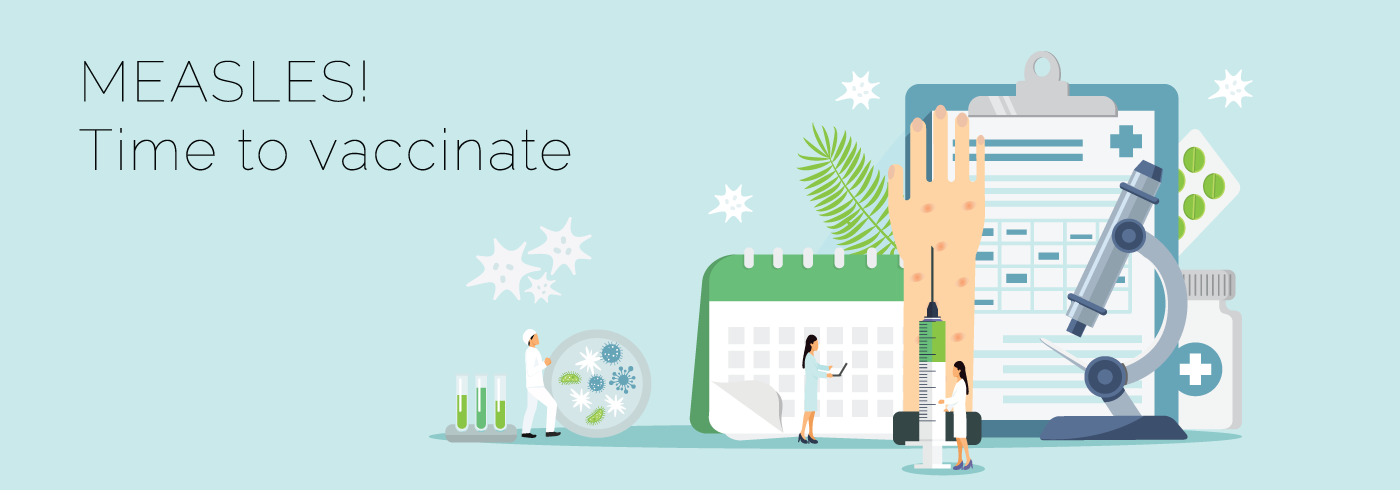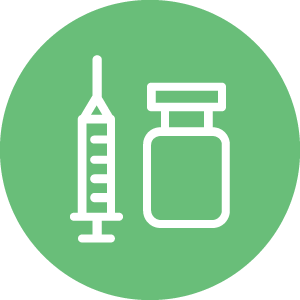
Measles Case and Contact Information Hub
- To date for 2025, Durham Region has no confirmed cases of measles.
- Durham Region Health Department investigates measles exposure locations identified in Durham Region.
- See our news release dated July 23, 2025 for the exposure location and further information.
- See our news release dated June 4, 2025 for exposure locations and further information.
- Vaccinations are very effective to prevent the spread of measles. Keep up-to-date with your routine immunization, including measles, mumps and rubella (MMR) vaccination.
How it spreads
Measles is a very contagious viral infection. The measles virus is in the nose and throat of an infected person. It can spread easily to others when they come in contact with droplets of an infected person or the air where an infected person has breathed, coughed, or sneezed. The virus can enter the body through the eyes, nose, or mouth.
- Someone who is contagious with measles can spread it to others from four days before a rash appears to four days after the rash appears.
- Measles virus can live up to two hours in the air after an infected person leaves the area.
Symptoms include:
- High fever (greater than or equal to 38.3 degrees Celsius)
- Runny nose
- Cough
- Red and watery eyes
- Feeling tired
- Small white spots (Koplik spots) can appear on the inside of the mouth and throat.
- About three to seven days after symptoms begin, a red rash appears that typically begins on the head and spreads down the body to the arms and legs. The rash disappears in the same order of appearance (head to foot) in about four to seven days.
People who have received one or two doses of measles vaccine may present with milder symptoms.
Measles can also lead to:
- Dehydration
- Ear infections
- Diarrhea
- Lung infections (pneumonia)
- Blindness
- Swelling of the brain (encephalitis)
- Hearing loss
- Seizures
- Permanent brain damage (subacute sclerosing panencephalitis)
- Death
- Infants under 12 months and people who are pregnant or have a weak immune system can get very sick from measles.
- Measles in pregnancy can lead to premature delivery, low birth weight and miscarriage.
Exposure and risk
| Age/Setting | Immunity (Vaccine Status) | Comment/Action |
|---|---|---|
|
I was born before 1970 and I was exposed to measles. |
Anyone born before 1970 has likely developed immunity to measles virus because measles was present at that time. |
If you are not sure of your immunity, you can get a dose of MMR vaccine. Monitor and watch for symptoms of measles. |
|
I was born after 1970 and I was exposed to measles. |
Check your immunization record to confirm you had two doses of measles vaccines (e.g., MMR). Some people in this age group may only have received one dose. Two doses are needed for full protection. |
If you have no documentation of measles vaccination, or only received one dose, get the MMR vaccine. Monitor and watch for symptoms of measles. |
|
I work in a health care setting and I was exposed to measles. |
Check your immunization record to confirm you had two doses of measles vaccines (e.g., MMR). You are at a higher risk of spreading the virus to the vulnerable population. All health care workers must show evidence of immunity (by proof of vaccinations or blood test) prior to working in a health care setting. |
If you have no documentation of two doses of measles vaccination, you are excluded from your workplace for 21 days from the date of exposure, or until your immune status is verified (by proof of vaccinations or blood test). If you have received only one documented dose of measles vaccination, without laboratory evidence of immunity or history of laboratory confirmed measles, you should be tested for measles immunity and receive one dose of MMR vaccine immediately. You are excluded from your workplace while waiting for the blood test result. Call Durham Region Health Department to discuss and notify your workplace occupational health department. Monitor and watch for symptoms of measles. |
|
I am a student who attends school or child care and I was exposed to measles. |
Check your immunization record to confirm you had two doses of measles vaccines (e.g, MMR). |
If you have no documentation of two doses of measles vaccination, you are excluded from school/child care for 21 days from the date of exposure, or until your immune status is verified (by proof of vaccinations or blood test). Call Durham Region Health Department to discuss and notify your school/child care. Monitor and watch for symptoms of measles. |
|
I work in a school, child care, college or university setting, and I was exposed to measles. |
Check your immunization record to confirm you had two doses of measles vaccines (e.g., MMR). |
If you have no documentation of two doses of measles vaccination, you are excluded from your workplace for 21 days from the date of exposure, or until your immune status is verified (by proof of vaccinations or blood test). Call Durham Region Health Department to discuss and notify your school/institution. Monitor and watch for symptoms of measles. |
|
I live in a college, university, or military setting, and I was exposed to measles. |
Check your immunization record to confirm you had two doses of measles vaccines (e.g., MMR). |
If you have no documentation of two doses of measles vaccination, you are excluded from your college/university or military for 21 days from the date of exposure, or until your immune status is verified (by proof of vaccinations or blood test). Call Durham Region Health Department to discuss and notify your school/institution. Monitor and watch for symptoms of measles. |
|
I am pregnant or have a weakened immune system that makes it harder to fight infections, and I was exposed to measles. |
Check your immunization record to confirm you received two doses of measles vaccines (e.g., MMR). |
Consult with your health care provider to determine your immune status (by proof of vaccinations or blood test). Call Durham Region Health Department for further directions. Monitor and watch for symptoms of measles. |
| Reviewing and updating immunization records | ||||||||
|
You may contact your health care provider or Durham Region Health Department to obtain your immunization record. Parents can review and update immunization records for their school-aged children online: |
||||||||
| Immune globulin for post exposure protection | ||||||||
|
Immune globulin (Ig) may be given to people who are contacts of measles and if they are unable to receive the vaccine and/or if they are at higher risk of complications, such as infants, pregnant women, and people with weakened immune systems. Ig is made from donated human blood plasma that contains antibodies to protect against infections including measles. It can provide immediate, short-term protection when given within six days after exposure to measles.
|
Seeking medical care
If you think you have measles:
- Call your health care provider immediately so they can prepare for your arrival and prevent virus spread.
- Do not visit a clinic or hospital without calling them first and informing them.
- Wear a well-fitted mask when seeking medical assessment.
Your doctor will test you if they suspect you have measles.
- Measles is diagnosed with laboratory tests including a blood, urine, and throat test.
- It can take a few days for the laboratory to confirm test results.
- There is no specific treatment for measles and most people can recover at home.
- Hospitalization may be required for severe infections.
After being tested for measles, you will need to isolate by staying home and avoiding contact with others. Do not attend work, school, or child care. Follow the isolation guidance.
Measles testing
If you think you have measles:
- Call your health care provider immediately so they can prepare for your arrival and prevent virus spread.
- Do not visit a clinic or hospital without calling first.
- Wear a well-fitted mask when visiting your health care provider.
If your doctor suspects you have measles, the following laboratory samples will be collected:
- Throat swab
- Nasopharyngeal swab
- Urine
- Blood
It can take a few days for the laboratory to confirm test results.
After being tested for measles, you need to isolate by staying home and avoiding contacts with others. Do not attend work, school, or child care until further direction is provided by Durham Region Health Department. Follow the self-isolation guidance.
Measles vaccines
Measles is best prevented by vaccination
The effectiveness of a single dose of measles vaccine received at 12 to 15 months of age is estimated to be 85 to 95 per cent; with a second dose, the effectiveness is almost at 100 per cent.
There are two types of measles-containing vaccines available in Canada: MMR (measles-mump-rubella) and MMRV (measles-mumps-rubella-varicella).
Learn about Ontario's routine immunization schedule and protect your children and community.
Facts About… Measles, Mumps, Rubella Vaccine Facts About… Measles, Mumps, Rubella, Varicella Vaccine
Travel
Planning to travel?
- Measles outbreaks are occurring worldwide, and vaccination is very effective in preventing measles infection.
- As of May 2025, measles vaccine eligibility has been expanded for individuals who live, work, travel (e.g., family visit), worship, or spend time in the affected regions and communities in Ontario that continue to see increased transmission and community exposures. Talk to your health care provider to discuss if you are eligible to receive a dose of MMR vaccine.
- Measles is highly contagious and can lead to severe, long-lasting health complications.
- Make sure you and your family are up to date on measles and other routine vaccinations before travelling.
Planning to travel, protect your family from measles
Contact Us












